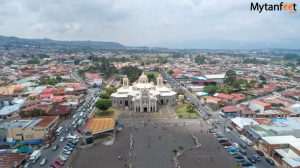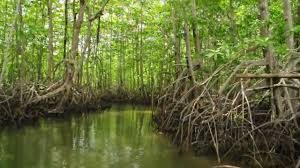Dr. Scott Martin and Dr. Lara Martin Lengel are leading a Study Abroad trip to Costa Rica during the Winter Session of 2020. Both have been traveling to Costa Rica since 2011, and have plenty of experience exploring the country. Undergraduate Student Mary Wires asked some questions of Dr. Scott Martin about the themes and goals for the Study Abroad. Here are his answers:
1. What inspired you to lead this study abroad?
My spouse, Dr. Lara Martin Lengel, and I have been visiting Costa Rica since 2011. We’ve travelled extensively in country, visiting towns, cities, locations of interest (volcanos, rainforests), and several university campuses. In addition, Lara has taught study abroad courses in Italy, China, and Morocco.
Costa Rica has impressed us as a beautiful place, but also as a stable democracy committed to social equality and environmental preservation. As the safest country in Central America, it seemed an ideal destination for a study abroad course.
2. What do you hope students will get out of the course?
We hope that students gain experience with a culture very different from the one in which they were raised. Costa Rica’s government presents some stark contrasts to the US. For example, Costa Rica abolished its armed forces in 1948, and has devoted significant effort and tax revenue to preserving the country’s biodiversity and ecosystems. Costa Rica leads the world in addressing global climate change. Costa Ricans are working toward becoming a carbon neutral nation, a goal the government aims to achieve in 2021. Costa Rica’s approach to social, economic, and environmental issues diverge in many ways from the US approach, and we hope that students gain an appreciation of how another democracy approaches these crucial issues.
3. In general, what is the benefit of studying abroad? More specifically, what is the benefit of THIS study abroad opportunity?
Studying abroad expands students’ intellectual horizons, giving them another point of reference from which to view the world in which we all live. It provides the opportunity to recognize both differences and similarities to the US experience in other nations and regions, broadening their knowledge and appreciation of other cultures in an increasingly interconnected world. This study abroad opportunity offers these benefits in the context of a safe and culturally vibrant destination. Our knowledge of the country has enabled us to plan the trip without using outside vendors, ensuring a less touristic experience than standard tours, and holding down costs. We include experiences unique to Costa Rica: service learning components (volunteering at a rescued animal center housing sloths, howler monkeys, and a variety of other animals), tours of coastal areas and biodiverse mangroves, a visit to an indigenous village, a day trip to a volcano, and Precolumbian archaeological sites, as well as museums and attractions.
4. What is the purpose of the four phases, in terms of topics and locations?
Each phase (1. Alajuela Province/Central Valley; 2. Central Pacific Coast; 3. Southern Pacific Region; and the 4. Central Highlands) introduces a different area of the country, linked to a specific course theme.
In Alajuela the groups visits an animal refuge center to learn about biodiversity and efforts to protect endangered or threatened species, as well as the culture of the region surrounding San Jose, the capital.
The second phase, on the central Pacific coast, addresses sustainable tourism and the struggle to preserve the fragile but environmentally crucial ecosystems, such as mangrove swamps.
The third phase, in the southern Pacific region, examines Costa Rican history and culture through visits to archaeological sites and Térraba, a village where the indigenous Teribe people strive to preserve their distinctive history and culture.
Finally, the fourth phase explores Costa Rican history and contemporary culture through visits to Cartago, Costa Rica’s colonial capital, Alajueala, a city important to the nation’s history and identity, and San Jose, the nation’s capital.
5. How do the assignments fit with your goals for the students?
Assignments include reflections on student’s experiences, and a research project based on each students’ particular interests. Students will use printed sources and their experiences in Costa Rica to produce a research paper on topic in Costa Rican history, culture, or society. Examples include sustainable tourism, environmental policy, gender in Costa Rica, relations with the US, or Costa Rican social and cultural identity.
6. What are the broad topics you want to address in this course?
As noted in responses to the previous questions, we will address Costa Rican history and culture, environmental policy, preservation of biodiversity, gender, tourism, social policy, and other topics related to Costa Rica’s unique role in Latin America and the world (Please see, also, the course itinerary and syllabus).
Don’t miss out on this great opportunity! Email Dr. Scott Martin at smartin@bgsu.edu for more information.



